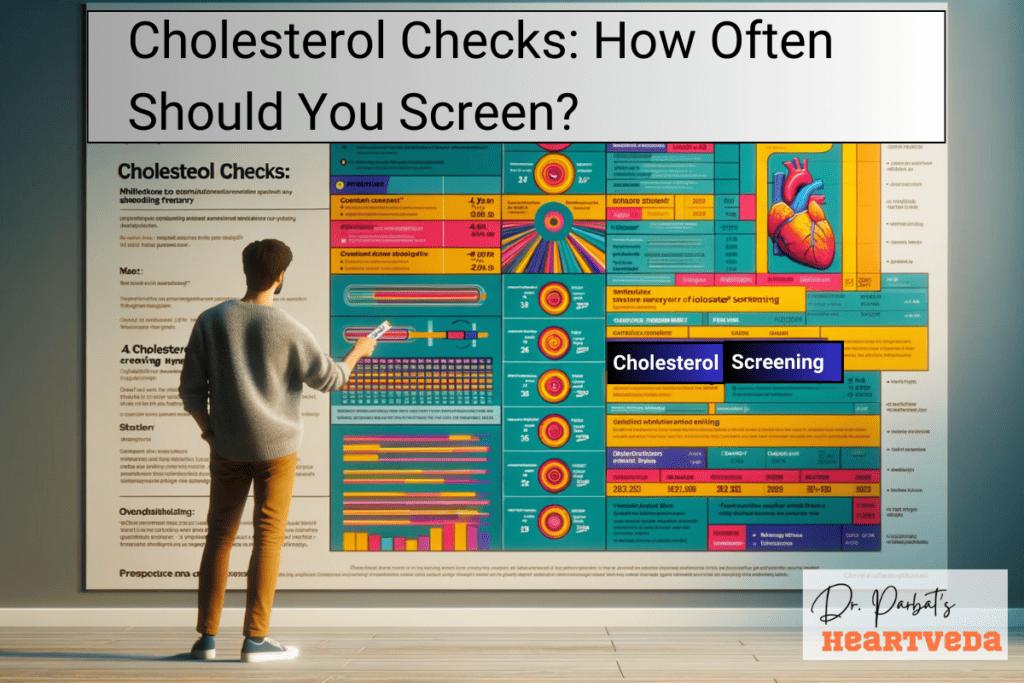
Knowing the optimal timing for cholesterol screening is vital for your health. If you’ve ever wondered “How often cholesterol screening?” should take place, you’re asking an important question. Unchecked, high cholesterol is an invisible threat that can lead to severe health issues such as heart disease or stroke. Adolescents and adults alike are susceptible to unhealthy cholesterol levels, which is why regular checks are non-negotiable.
To gauge your cholesterol health accurately, a lipid profile—a blood test—is the gold standard. It delves deep into your cholesterol makeup, measuring Low-density lipoprotein (LDL), High-density lipoprotein (HDL), triglycerides, and total cholesterol. The frequency of these screenings can vary; while most adults may only need a cholesterol check every 4 to 6 years, specific conditions could prompt the need for more frequent assessments.
Indeed, if you have diabetes, heart disease, or a family history peppered with high cholesterol, stepping up your cholesterol screening frequency makes good health sense. Plus, young people are not exempt. Children and adolescents should have their cholesterol levels screened at least twice before turning 21, particularly if they face obesity or diabetes. But remember, preparation is key. Most often, you’ll need to fast for 8 to 12 hours before ‘test time’, but your doctor will give you the exact run-down.
Determining when and how often you should have your cholesterol checked is critical to maintaining heart health, and the 2018 ACC/AHA Guidelines recommend an approach tailored to your individual cardiovascular risk over your lifetime. By partnering with your healthcare provider and getting regular cholesterol checks, you can manage your levels proactively and holistically.
The Silent Risks of High Cholesterol
Often referred to as the silent killer, high cholesterol may not cause noticeable symptoms but poses serious risks to your health. Regular cholesterol check-ups are essential because without them, the only way you might learn about high cholesterol could be through a life-altering event such as a heart attack or stroke. With a significant proportion of the US adult population battling high cholesterol levels, cholesterol screening guidelines strongly recommend proactive measures for monitoring cholesterol.

In your pursuit to stay healthy, cholesterol screening guidelines play a crucial role. It’s your invisible line of defense. For at-risk individuals—those with a personal or family history of diabetes, heart disease, or unhealthy lifestyle choices such as smoking—sticking to a regimen of more frequent screenings is key to preventive health care.
- Understand your risk factors: family history, current health, lifestyle habits
- Follow your healthcare provider’s advice for screening frequency
- Maintain a health log and track your cholesterol levels over time
- Make lifestyle changes as recommended based on screening outcomes
Don’t wait for symptoms to alert you to an issue. Instead, consider regular cholesterol check-ups as a vital component of your healthcare routine, ensuring you remain one step ahead in safeguarding against cholesterol-related complications.
How Often Cholesterol Screening Should Be Done
Understanding the recommended frequency for cholesterol screening is a vital aspect of your healthcare routine. It’s important to know how often should you get your cholesterol checked to maintain a healthy lifestyle and prevent health complications associated with high cholesterol levels. Let’s look at the screening frequencies recommended by healthcare professionals.
If you’re wondering “how often should I get my cholesterol checked,” the guidelines are fairly straightforward. For most adults, the standard recommendation is to undergo a cholesterol screening every 4 to 6 years. However, certain age groups and individuals with specific risk factors might need to consider more frequent screenings.
| Age Group | Recommended Screening Frequency |
|---|---|
| 9-11 years old | Initial screening, then every 5 years |
| 17-21 years old | Screening once before adulthood |
| Adults 20-45 years old | Every 4 to 6 years |
| Men 45-65 years and Women 55-65 years | At least every 1 to 2 years |
| Individuals over 65 years | Annually |
| High-risk individuals | More frequent screenings as advised by a physician |
While these are general guidelines, it’s essential to remember that your personal medical history, family background, and other health-related factors may require a tailored screening schedule. High-risk individuals, particularly those with a family history of heart disease or high cholesterol, should stay in active communication with their healthcare provider to determine the most appropriate screening frequency.
- If you have diabetes or heart disease, more frequent screenings are advised.
- Those who smoke or have lifestyle factors influencing cholesterol levels should consult their doctor for personalized recommendations.
- It is crucial to proactively manage risk factors to prevent atherosclerosis and its complications.
In conclusion, keeping track of cholesterol levels is a proactive step towards managing your health. By adhering to recommended screening intervals, you can detect potential health issues early and implement necessary interventions.
Factors Influencing Cholesterol Screening Frequency
Understanding the frequency of lipid panel testing and the frequency of cholesterol tests is essential for maintaining your heart health. There are several critical factors that might determine how often you should have your cholesterol levels checked:
- Age: As you get older, your risk for heart disease may increase, necessitating more frequent screenings.
- Family History: If high cholesterol or heart attacks run in your family, you might need cholesterol tests more often.
- Weight: Being overweight can raise your cholesterol levels and may require more frequent monitoring.
- Physical Activity Levels: A sedentary lifestyle could lead to higher cholesterol, warranting regular tests.
- Presence of Diabetes: Diabetes significantly affects cholesterol levels, thus more frequent testing may be recommended.
- Dietary Habits: Your eating patterns have a direct impact on your cholesterol and might alter the frequency of testing needed.
- Smoking Status: Smoking can negatively affect your cholesterol levels, increasing the need for regular screening.
For those already managing high cholesterol with medication, healthcare providers may recommend more frequent lipid panel testing to ensure that treatment is effective. Moreover, the presence of other health conditions like high blood pressure could influence the frequency of cholesterol tests, keeping in view the overarching goal of reducing cardiovascular risks.
In certain cases, your healthcare provider might suggest additional tests, such as a coronary artery calcium (CAC) scan, to get a more comprehensive understanding of your cardiovascular health. This test, combined with a full lipid profile, can help tailor a cholesterol management plan that’s specific to your needs. Remember, these guidelines are not one-size-fits-all and should be personalized based on individual health profiles and risk factors.
Understanding the Lipid Profile: Components of a Cholesterol Test
When it comes to safeguarding your cardiovascular health, comprehending the components of a cholesterol test is a fundamental step. This detailed examination, known as a lipid profile, is not just a single measurement; it’s an aggregation of several critical markers in your blood that reveal the bigger picture of your heart’s well-being. The lipid profile includes assessments of total cholesterol, LDL cholesterol—which is often referred to as the ‘bad’ cholesterol for its role in arterial plaque formation—HDL cholesterol, celebrated as the ‘good’ cholesterol due to its function in escorting LDL away from your arteries, and triglycerides, essentially the stored form of excess calories in your cells.
Interpreting a lipid profile can be comparable to understanding a weather forecast for your health. It uses set benchmarks that categorize cholesterol values into the zones of desired, borderline, or high risk. Imagine LDL levels being a sunny day when they are below 100 mg/dL, suggesting everything is clear for heart health. Conversely, numbers soaring above this figure cast clouds of increased risk for coronary artery disease. Your HDL, meanwhile, should be akin to a protective umbrella—preferably open wide at 60 mg/dL or higher—to shield you from cardiovascular concerns. Lastly, maintaining triglycerides below the threshold of 150 mg/dL is like the calm before a storm, keeping your risk of heart disease at bay.
Your awareness and understanding of these figures are not just academic. They’re actionable insights. Recognizing where your cholesterol numbers fall within these ranges allows you to navigate your health journey with precision. Whether it’s tweaking your lifestyle with the right diet and exercise, or if necessary, discussing medication options with your healthcare provider, you’re in the pilot’s seat. Ultimately, your lipid profile is a crucial navigational tool, guiding you towards longevity and quality of life. So when you hear about the components of a cholesterol test, know that you’re actually unlocking the secrets to a healthier heart and a brighter future.
Key Takeaways
- Regular cholesterol screenings are vital for detecting and managing high cholesterol levels.
- The standard cholesterol screening frequency for adults is every 4 to 6 years—but more often if you have underlying health issues.
- Children and adolescents should undergo screenings to catch potential risks early.
- Screening preparation generally involves fasting; consult your doctor for precise instructions.
- Individual cardiovascular risk factors should shape your cholesterol management plan.
- An informed decision about your cholesterol health hinges on a complete lipid profile test.
